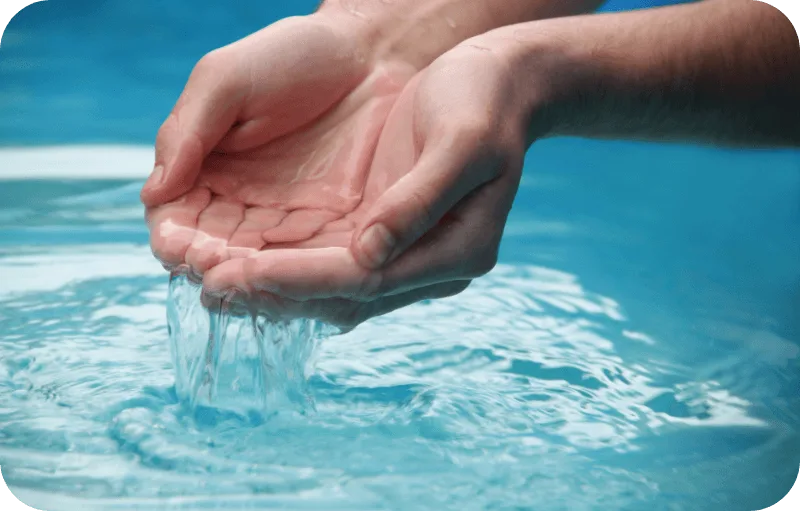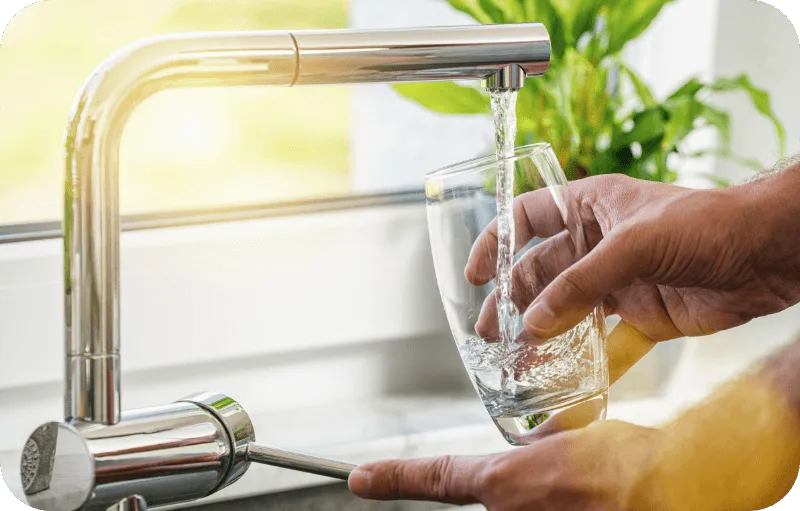3 Surprising Benefits of Water You Probably Didn’t Know

In the ever-evolving world of wellness and anti-aging, it’s easy to overlook the simplest of solutions.
While we often seek cutting-edge supplements and biohacking strategies, one of the most effective tools for enhancing our health and longevity is right in front of us—water.
Beyond its well-known role in keeping us hydrated, water offers some surprising benefits that can significantly impact your health and aging process.
Here are three unique advantages of water that might just surprise you:
1. Water’s Role in Detoxification
Most people know that drinking water helps flush out toxins from the body, but its deeper impact on cellular detoxification is truly remarkable.
Water supports the body’s ability to remove metabolic waste and environmental toxins at the cellular level, which can enhance overall health and vitality.
By staying well-hydrated, you’re aiding your body’s natural detoxification processes, which helps maintain clearer skin and supports the function of your liver and kidneys—crucial organs for staying youthful and energetic.
2. Enhances Skin Elasticity and Reduces Wrinkles
Hydrated skin is often praised for its glow, but water also plays a critical role in maintaining skin elasticity.
Proper hydration helps the skin retain its natural firmness and suppleness, which is key to preventing premature aging signs such as wrinkles and fine lines.
When you’re well-hydrated, your skin remains plump and resilient, contributing to a more youthful appearance and reducing the visible effects of aging.
The Role of Hydration in Skin Structure
The skin’s structure and appearance are directly influenced by its hydration levels.
The outermost layer of the skin, known as the epidermis, relies on adequate moisture to function effectively.
Hydration supports the skin’s ability to retain elasticity and plumpness, which are essential for preventing the formation of fine lines and wrinkles.
Skin Elasticity: Hydrated skin maintains its elasticity and resilience. Water is a crucial component of the skin’s extracellular matrix, which helps support and cushion skin cells. When the skin is well-hydrated, it can better bounce back from various stresses, including facial movements, reducing the likelihood of fine lines forming.
Skin Barrier Function: The skin barrier, or stratum corneum, acts as a protective layer that prevents moisture loss and shields against environmental aggressors. Adequate hydration strengthens this barrier, preventing it from becoming dry and compromised, which can otherwise lead to the development of wrinkles.
Cell Turnover: Adequate hydration supports optimal cell turnover, ensuring that new, healthy skin cells are generated efficiently. Well-hydrated skin can shed dead cells more effectively, leading to a fresher and more even complexion.
Nutrient Delivery: Hydration facilitates the transport of essential nutrients and oxygen to skin cells, which are vital for their repair and regeneration. This nourishment helps maintain skin health and resilience.

3. Water Improves Cognitive Function and Mood Stability
Water is crucial for maintaining cognitive health and emotional balance.
While it might seem straightforward, the way hydration affects brain function and mood is quite intricate and fascinating:
Supports Brain Function
The human brain is composed of about 75% water, and even slight dehydration can impact its performance.
When you’re well-hydrated, your brain operates more efficiently. Water supports the brain’s ability to generate electrical impulses, which are vital for neurotransmission and overall cognitive function.
This means that staying hydrated can enhance memory, concentration, and mental clarity.
In contrast, dehydration has been linked to decreased cognitive performance, such as difficulties in focusing and slower reaction times.
Studies show that even mild dehydration can impair short-term memory and complex thinking, so maintaining optimal hydration levels is crucial for sharp and efficient brain function.
Regulates Mood and Stress Levels
Hydration also plays a key role in regulating mood and stress. The brain’s ability to manage emotions and stress is closely linked to its hydration status.
Dehydration can disrupt the balance of neurotransmitters—chemical messengers that influence mood and emotional state.
This disruption can lead to irritability, anxiety, and an overall decline in mood. Additionally, dehydration affects cortisol levels, the body’s primary stress hormone.
When you’re adequately hydrated, your body is better equipped to handle stress and maintain emotional stability.
Studies have demonstrated that even mild dehydration can elevate stress levels and reduce overall mood, highlighting the importance of consistent water intake for emotional well-being.
Enhances Cognitive Flexibility
Cognitive flexibility, or the brain’s ability to adapt to new information and shift between tasks, is another area where hydration makes a significant impact.
Water helps to maintain the balance of electrolytes, which are essential for neuronal function and plasticity—the brain’s ability to adapt and reorganize itself.
Adequate hydration supports this flexibility, allowing for better problem-solving, creativity, and adaptability.
Conversely, dehydration can hinder cognitive flexibility, making it harder to process new information and adapt to changes.
Practical Tips To Ensure You’re Drinking Enough Water
Start Your Day with a Glass of Water: Begin each morning by drinking a glass of water. This simple habit helps jumpstart your metabolism, rehydrate your body after a night’s sleep, and sets a positive tone for the rest of the day.
Carry a Reusable Water Bottle: Keep a reusable water bottle with you at all times. Having water readily available makes it more likely that you’ll remember to drink throughout the day. Opt for a bottle that suits your lifestyle, whether it’s insulated, collapsible, or features a built-in filter.
Set Regular Hydration Reminders: Use alarms or hydration apps to remind you to drink water at regular intervals. Setting reminders every hour can help you stay on track and prevent dehydration, especially during busy days.
Flavour Your Water Naturally: If plain water isn’t your favorite, try infusing it with natural flavors. Add slices of lemon, cucumber, or berries to your water for a refreshing taste without added sugars or calories. Herbal teas can also be a great way to increase fluid intake.
Eat Water-Rich Foods: Incorporate fruits and vegetables with high water content into your diet. Cucumbers, watermelon, oranges, and strawberries are not only hydrating but also provide essential vitamins and nutrients.
Monitor Your Fluid Intake: Keep track of how much water you’re drinking daily. Aim for at least 8 glasses (about 2 liters) of water, but adjust based on your activity level, climate, and individual needs. Tools like hydration trackers or simple apps can help you stay aware of your intake.
Drink Water Before Meals: Make it a habit to drink a glass of water before each meal. This not only helps with hydration but can also aid digestion and help you feel fuller, potentially reducing overeating.
Hydrate During Exercise: Increase your water intake before, during, and after physical activity. Sweating leads to fluid loss, so it’s crucial to replenish what you’ve lost to maintain optimal performance and recovery.
Use a Hydration Journal: Keep a hydration journal to log your daily water intake. This can help you identify patterns, track your progress, and stay motivated to meet your hydration goals.
Watch for Signs of Dehydration: Pay attention to signs of dehydration such as dark yellow urine, dry skin, fatigue, and dizziness. If you notice any of these symptoms, increase your water intake and consult a healthcare professional if necessary.

Conclusion
Incorporating these tips into your daily routine can offer significant benefits for your overall health and longevity. While advanced supplements and biohacking techniques have their place, never underestimate the power of good hydration.
Here’s to embracing the simple yet profound benefits of water for a healthier, more youthful you!



